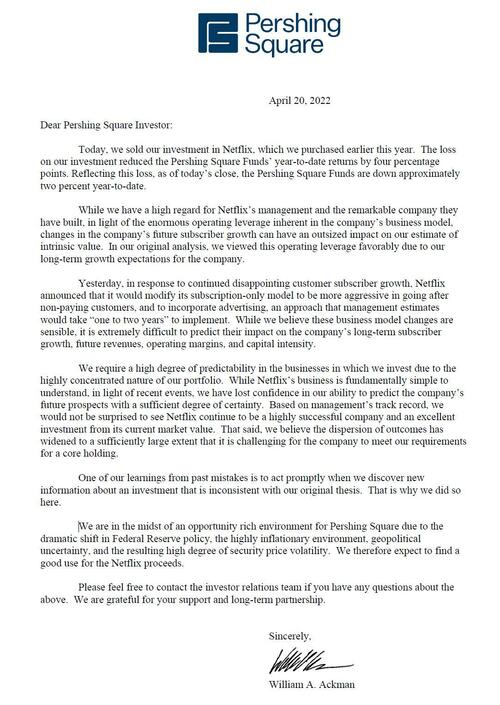Bill Ackman Dumps Entire Netflix Stake, Loses $430 Million In 4 Months
Back on Jan 27, and just days after NFLX crashed after its dismal Q4 2021 earnings (not to be confused with its even more dismal Q1 2022 earnings yesterday) we reported that with proceeds earned from his massive Treasury short, Bill Ackman had purchased 3.1 million shares of Netflix stock in the mid-$300s.
We recently purchased more than 3.1m shares of @Netflix which makes us a top-20 holder. I have long admired Reed Hastings and the remarkable company he and his team have built. We are delighted that the market has presented us with this opportunity. https://t.co/BNx1EWUVGh
— Bill Ackman (@BillAckman) January 26, 2022
Ackman said that “beginning on Friday and over the last several days, we acquired more than 3.1 million shares of Netflix… which makes us a top-20 holder.”
Well not any more, because after NFLX stock crashed a record 35% today, Ackman today was less than delighted with the latest opportunity the market presented him with, in this case to lose some $430 million in less than four month, because unlike other investors who double down when presented with a real opportunity to invest in a name they believe in, Ackman decided to bail instead demonstrating yet again that for so many traders the real “strategy” is to buy high and sell low.
In a release published after the close, Ackman’s Pershing Square said that it has sold its entire investment in Netflix, which was purchased in January. “The loss on our investment reduced the Pershing Square Funds’ year-to-date returns by four percentage points. Reflecting this loss, as of today’s close, the Pershing Square Funds are down approximately two percent year-to-date.”
Here is how Bill Ackman, best known for such stellar investments as JCPenney, Herbalife, Valeant and so on, justified to his investor his latest cash bonfire:
While we have a high regard for Netflix’s management and the remarkable company they have built, in light of the enormous operating leverage inherent in the company’s business model, changes in the company’s future subscriber growth can have an outsized impact on our estimate of intrinsic value. In our original analysis, we viewed this operating leverage favorably due to our long-term growth expectations for the company.
Yesterday, in response to continued disappointing customer subscriber growth, Netflix announced that it would modify its subscription-only model to be more aggressive in going after non-paying customers, and to incorporate advertising, an approach that management estimates would take “one to two years” to implement. While we believe these business model changes are sensible, it is extremely difficult to predict their impact on the company’s long-term subscriber growth, future revenues, operating margins, and capital intensity.
We require a high degree of predictability in the businesses in which we invest due to the highly concentrated nature of our portfolio. While Netflix’s business is fundamentally simple to understand, in light of recent events, we have lost confidence in our ability to predict the company’s future prospects with a sufficient degree of certainty. Based on management’s track record, we would not be surprised to see Netflix continue to be a highly successful company and an excellent investment from its current market value. That said, we believe the dispersion of outcomes has widened to a sufficiently large extent that it is challenging for the company to meet our requirements for a core holding.
That’s a lot of words to say we did zero actual analysis when we bought over $1.2 billion in NFLX shares, and now that we have lost a third of our investment and finally did the analysis, we realized we had just wasted a lot of LP cash.
Of course, saying that would be a little too truthy, so even the “lessons learned” was couched in corporate speak:
One of our learnings from past mistakes is to act promptly when we discover new information about an investment that is inconsistent with our original thesis. That is why we did so here.
Here is the real “learnings”: while some traders double down when they have confidence in their investment, and having done their homework are able to take advantage of market dislocations and double down, others – who are only looking at price – buy high and sell low.
It’s clear which type of investor Ackman is.
And speaking of real investors, once again Carl Icahn mops the floor with Ackman: as a reminder, the venerable corporate raider made more than $2 billion on NFLX, after buying $321 million in 2012 and selling everything three years later to make a $2 billion profit.
Sold last of our $NFLX today. Believe $AAPL currently represents same opportunity we stated NFLX offered several years ago.
— Carl Icahn (@Carl_C_Icahn) June 24, 2015
Ackman, on the other hand, just lost nearly half a billion in less than 4 months.
Needless to say, it would be delightfully ironic if Icahn was quietly buying up the shares that Ackman was selling.
Did you buy Ackman’s stake? https://t.co/xuZ8wXl1CR
— zerohedge (@zerohedge) April 20, 2022
And yes, with the selling overhang now gone, expect NFLX stock to soar in the coming days and weeks.
Here is the full Pershing Square letter (pdf link).
Tyler Durden
Wed, 04/20/2022 – 19:30
via ZeroHedge News https://ift.tt/WGJYb5d Tyler Durden
